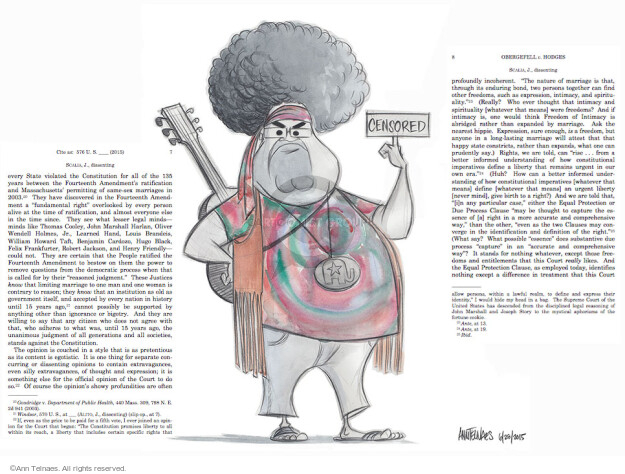Archives
For licensing information, please contact atelnaes@anntelnaes.com.

Censored. Cite as: 576 U.S. – (2015). Scalia, J., dissenting. Every State violated the Constitution for all of the 135 years between the Fourteenth Amendment’s ratification and Massachusetts’ permitting of same-sex marriage in 2003. They have discovered in the Fourteenth Amendment a fundamental right overlooked by every person alive at the time of ratification, and almost everyone else in time since. They see what lesser legal minds – minds like Thomas Cooley, John Marshall Harlan, Olive Wendall Holmes, Hr., Learned Hand, Louis Brandeis, William Howard Taft, Benjamin Cardozo, Hugo Black, Felix Frankfurter, Robert Jackson, and Henry Friendly – could not. They are certain that the People ratified the Fourteenth Amendment to bestow on them the power to remove questions from the democratic process when is called for by their reasoned judgment. These Justices know that limiting marriage to one mand and one woman is contrary to reason; they know that an institution as old as government itself, and accepted by every nation in history until 15 years ago, cannot possibly be supported by anything other than ignorance or bigotry. And they are willing to say that any citizen who does not agree with that, who adheres to what was, until 15 years ago, the unanimous judgment of all generations and all societies, stands against the Constitution. The opinion is couched in a style that is as pretentious as its content is egotistic. It is one thing for separate concurring or dissenting opinions to contain extravagances, even silly extravagances, of thought and expression; it is something else for the official opinion of the Court to do so. Of course the opinion’s show profundities are often profoundly incoherent. The nature of marriage is that, through its enduring bond, two persons together can find other freedoms, such as expression, intimacy and spirituality. (Really? Who ever thought that intimacy and spirituality [whatever that means] were freedoms? And if intimacy is, one would think Freedom of Intimacy is abridged rather than expanded by marriage. Ask the nearest hippie. Expression, sure enough, is a freedom, but anyone in a long-lasting marriage will attest that that happy state constricts, rather than expands, what one can prudently say.) Rights, we are told, can rise … from a better informed understanding of how constitutional imperatives define a liberty that remains urgent in our own era. (Huh? How can a better informed understanding of how constitutional imperatives [whatever that means] define [whatever that means] an urgent liberty [never mine], give birth to a right?) and we are told that, [i]n any particular case, either the Equal Protection of Due Process Clause may be thought to capture the essence of [a] right in a more accurate and comprehensive way, than the other, even as the two Clauses may converge in the identification and definition of the right. (What say? What possible essence does substantive due process capture in an accurate and comprehensive way? It stands for nothing whatever, except those freedoms and entitlements that this Court really likes. And the Equal Protection Clause, as employed today, identifies nothing except a difference in treatment that this Court … Obergfell v. Hodges. If, even as the price to be paid for a fifth vote, I never joined an opinion for the Court that began: The Constitution promises liberty to all within its reach, a liberty that includes certain specific rights that allow persons, within a lawful realm, to define and express their identity. I would hide my head in a bag. The Supreme Court of the United States has descended from the disciplined legal reasoning of John Marshall and Joseph Story to the mystical aphorisms of the fortune cookie.
